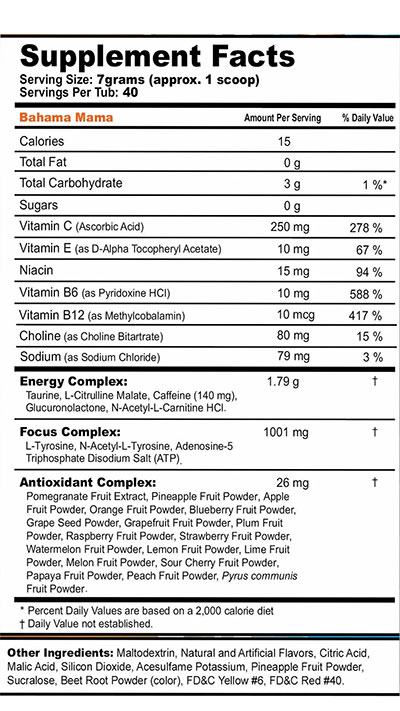G FUEL is a very popular energy drink, with even high-profile celebrities endorsing it. The immense popularity of G FUEL is also fueled by the fact that fitness enthusiasts consider it to be safe for consumption. The variety of flavors, price point, and “100% clean and natural” label also enhance its appeal.

But, is G FUEL good for you? Or should you be skeptical about these claims?
Let us find out!
Table of Contents
A close look at G FUEL ingredients
G FUEL has an incredibly long list of ingredients. Here are the main components that significantly impact our health and well-being.
1. Sweeteners
Most energy formulas are notorious for their sugar content. However, G FUEL has zero sugar. Nevertheless, it is sweet because the brand uses acesulfame potassium and sucralose as sugar substitutes.
Since the research on the safety aspects of sugar substitutes is still inconclusive, we cannot comment on the long-term implications of using them. Nevertheless, we know for sure that G FUEL does not deliver calories like sugar. Nor does it cause sudden spikes or lows in glucose levels.
G FUEL also uses maltodextrin as a preservative. Be mindful of this ingredient if you are diabetic or insulin resistant.
2. The Energy Complex in G FUEL
Of all the ingredients in the G FUEL energy blend, caffeine is the main stimulant.
Each serving of G FUEL contains as much caffeine as a medium cup of coffee. So, it is well within the recommended amount for adults. Nonetheless, moderation is key. Keeping the daily caffeine allowance in mind, you should not consume more than two servings of G FUEL per day.
Having more than the recommended daily allowance of caffeine can interfere with normal sleep. It can cause unwanted side-effects like restlessness. Caffeine is also addictive.
The amount of each of the other ingredients in the energy complex is not specified. However, they act together to increase energy, help electrolyte balance, detoxify the blood, and aid energy production. Some of the components also help to improve mood and reduce stress levels.

A serving of G FUEL will deliver 10 to 25 calories depending on the flavor. This is much lower than most sugar-laden energy drinks. However, if you keep a tight check on your calorie intake it can quickly add up.
3. The Focus Complex in G FUEL
Tyrosine, in the focus blend of G FUEL, is commonly used in energy supplements. It improves nervous stimulation and alertness. In G FUEL, the benefit is that tyrosine is present in its free form and readily absorbed by the body.
The focus complex also has ATP which is believed to boost the energy levels of working cells. The exact quantities of all these ingredients are not specified. So, we can only assume that they fall within the permissible limits set by the FDA.
4. Antioxidant Complex
The antioxidant complex is the storehouse of vitamins and minerals in the formula. G FUEL has an exhaustive list of 26 plant-based ingredients in the antioxidant complex. The purpose of antioxidants is to eliminate free radicals from the body. Most of them are fruit-based and natural.
G FUEL ingredients deliver Vitamin C, E, B6, and B12 to the body. Vitamin B12 in this formula is present in the form of methylcobalamin, which is easily absorbed by the body. Another relevant factor is that the vitamins in G FUEL are water-soluble. So, you do not have to worry about an overdose. Your body will get rid of the excess.
Does G FUEL have artificial colors?
Yes, G FUEL gets its vivid colors from artificial food dyes. Although all the dyes belong to the FDA-approved list of permissible food coloring agents, they are not natural. So, if you thought that the colors come from the fruit extracts that flavor the drink, you are wrong. They come from synthetic additives that are added to create the bright and characteristic colors of each flavor.
Does G FUEL have artificial preservatives and additives?
As with most energy drink formulas, G FUEL uses additives to stabilize the product and extend its lifespan. The brand mainly uses silicon dioxide and citric acid. Citric acid is a preservative while silicon dioxide prevents the caking of the powder.
Both these ingredients are FDA-approved and safe for consumption.
G FUEL also has 79mg of sodium per serving. Sodium is essential for proper nervous activity. However, G FUEL has very low sodium levels. So, it mostly acts as a preserving agent and does not contribute to the nervous activity.
Should you be worried or not about the presence of lead in G FUEL?
If you look at the G FUEL pack, you will notice a warning about chemicals and lead. Since it is quite frightening, we decided to check it out in closer detail.
Apparently, G FUEL may contain lead and other heavy metals since it contains natural ingredients. Plants that are cultivated in the soil can have trace amounts of lead and other heavy metals. However, it is usually negligible and harmless. G FUEL’s CEO mentions that the level of lead in their products is well below the FDA’s limits and should not be a significant concern for customers.
THE FINAL VERDICT: Is G FUEL bad for you?
It depends! According to the FDA, G FUEL consumption is not linked to carcinogenic, neurological, or reproductive risks. So, if you are a healthy adult over the age of 18 without any medical conditions, it should be fine to consume G FUEL.
Nonetheless, bear in mind that this energy formula is not 100% natural food. The different blends in it contain various ingredients that can produce unwanted reactions when over-consumed. It also has artificial colors and preservatives.
Most importantly, G FUEL is a caffeine-based formula. Since caffeine is addictive, you should consume it in moderation. Although it is sugar-free, G FUEL still contains sweeteners. The exact impacts of these sweeteners are still uncertain. Some of the other ingredients can also pose health risks if you are diabetic or insulin resistant. Compared to other brands, G FUEL is safer in many ways. It is also more effective in delivering consistent energy levels. However, it is not a natural beverage. Hence, we cannot entirely predict the long-term effects. It should be safe and effective when you stick to the recommended serving size.

After doing my own reading many years ago I decided to just search it up again to make sure nothing changed. Things are really well explained in these new analysis’ from people that know more than me and brought up a couple things that I wouldn’t have noticed.
Just ended up here when finding a second source, thanks a lot for putting all of this together! 🙂